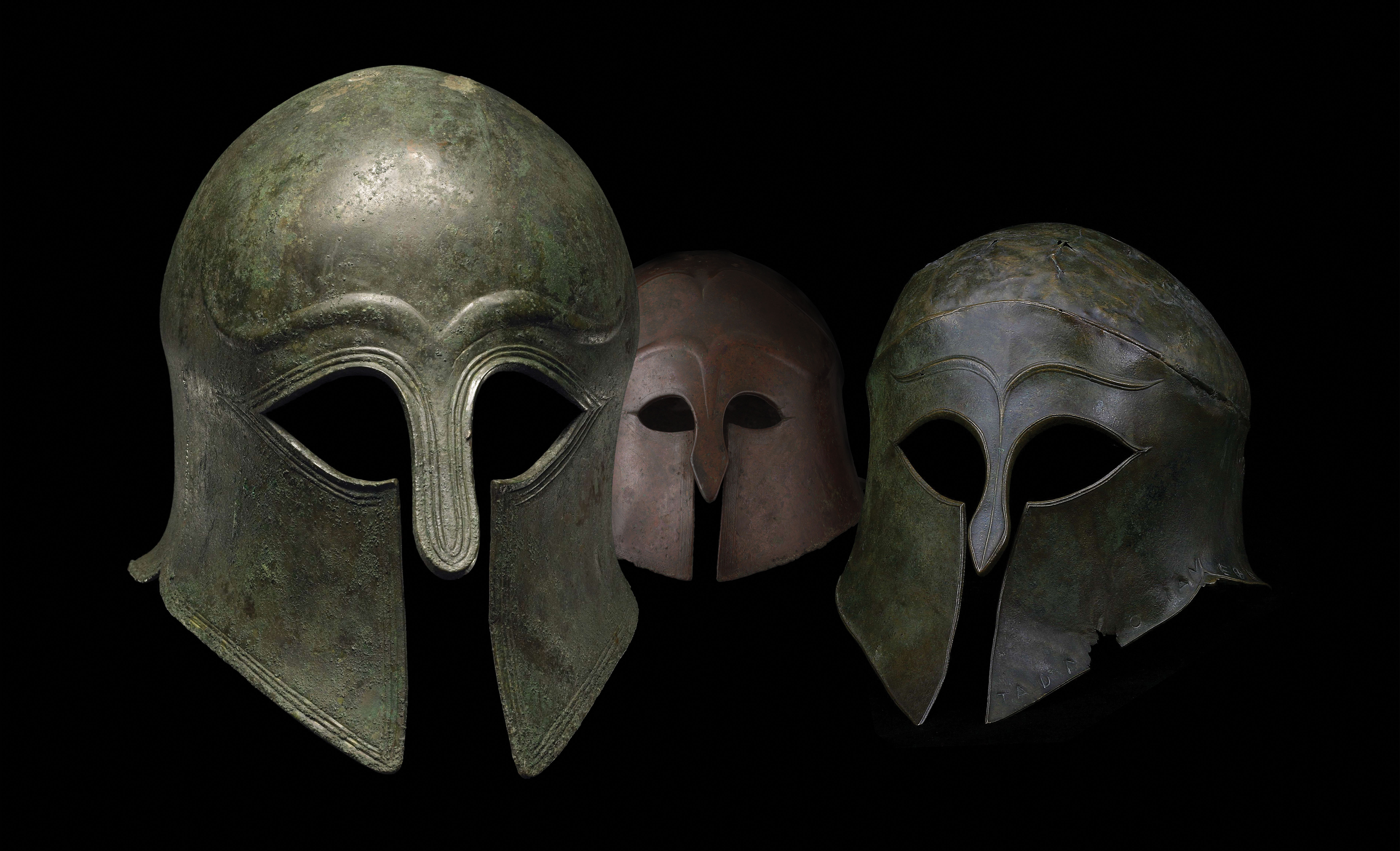When Athens sent a massive invasion fleet against Syracuse, it could not have anticipated the merciless Sicilian vendetta that followed
Athens invaded Sicily in 415 BC with soaring hopes and bold—albeit ill-defined—ambitions. Two years later the tattered remnant of its army was in full retreat, desperately seeking respite from the enemy it had intended to conquer. Bloodied, fearful, starving and plagued by continual assaults that thinned their ranks and destroyed their morale, the exhausted troops fled onward. There was no longer any thought of victory—only escape.
Harried by enemy cavalry, the Athenians sought refuge in the southern part of the island. With ebbing strength, few provisions and little water, they rushed to the Assinarus River, both to quench their desperate thirst and in hopes of crossing it to safety. There they found death rather than deliverance. All order was lost as they reached the river.
Plunging into the water, many struggled to be first across, while others drank greedily. Little did they know their crafty enemy lay in wait on the opposite bank. Attacked from the front and behind, scores died on the points of javelins or entangled themselves hopelessly with the baggage, stumbled and drowned. Surging down both banks, the enemy butchered many others with swords, fouling the water with gore even as desperate fellow Athenians continued to drink.
The most glorious Hellenic expedition undertaken during the 431–404 bc Peloponnesian War perished there in bloody mud. Its generals were executed. Any who escaped the slaughter were condemned to toil and misery in Sicilian stone quarries or sold into slavery. The disaster was so devastating and so complete that Athens could scarcely believe it had happened.
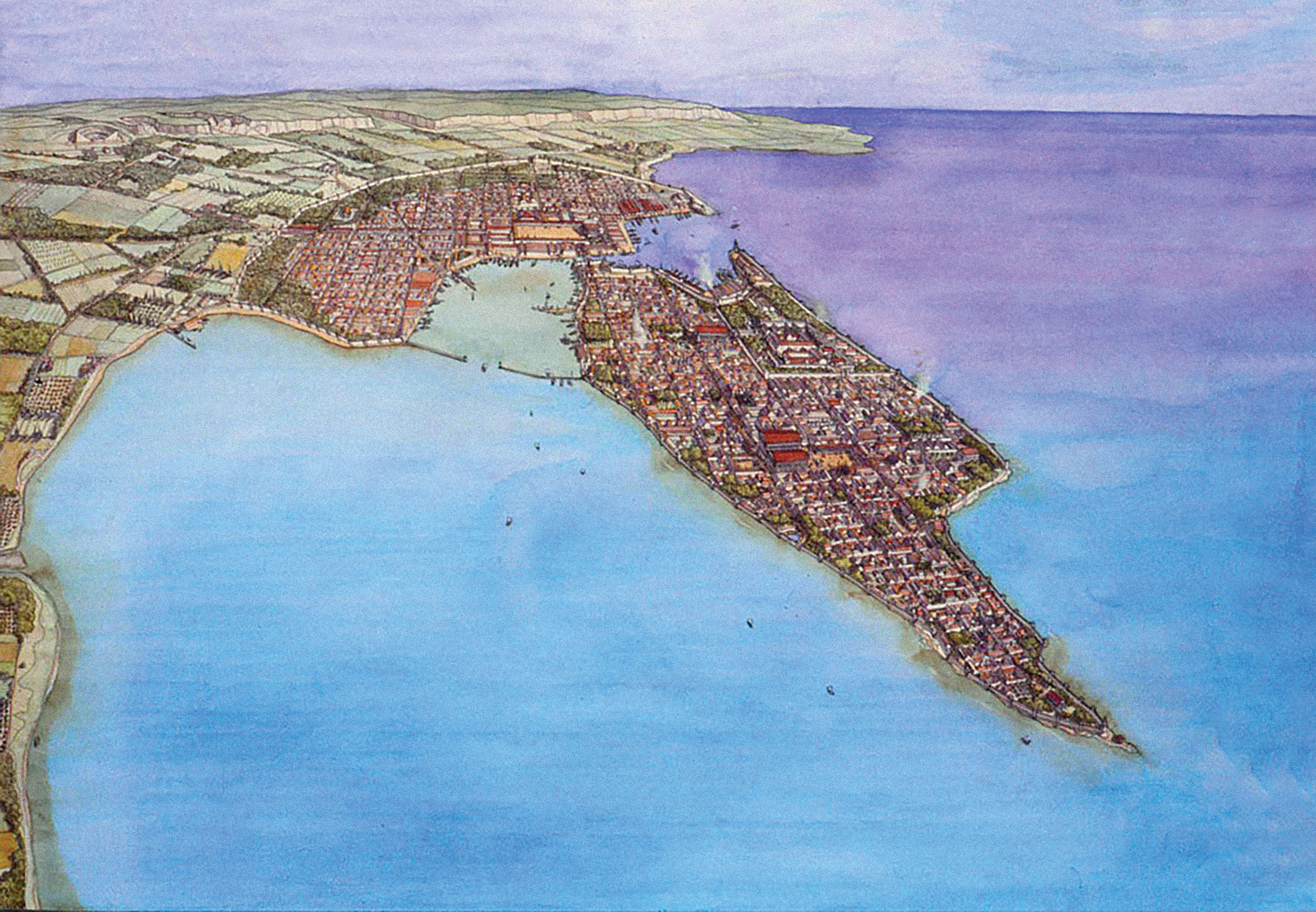
To fully understand the reckless daring of Athens’ invasion of Sicily, one must examine it in context, assessing its risks, murky motivations, dubious goals and problematic execution.
The backdrop to the Athenian invasion of Sicily is the Peloponnesian War. Six years into an armistice with Sparta, which had suspended open hostilities, the ecclesia—the Athenian assembly—ratified the decision to undertake the expedition. The Peace of Nicias was meant to last a half century, its signatories having sworn to uphold it. Yet the underlying causes of the war remained unresolved, and the respective parties never did strictly observe the agreement. Experience suggested conflict would likely erupt again.
In retrospect, it seemed foolhardy to undertake to conquer Syracuse, a city-state that rivaled Athens in population, size and wealth. Regardless, the ecclesia voted to send a fleet west across the Ionian Sea.
Nicias, the statesman-general and treaty namesake, warned his fellow Athenians against taking such an unnecessary risk. After all, the peace was precarious, and Athens’ many enemies stood ready to exploit any division of forces. It was better to secure the possessions they had, Nicias argued, before grasping for more. Yet the statesmen were unmoved. Instead, they fell under the sway of the imperialist upstart Alcibiades.
Hungry for glory and ambitious for power, he magnified the potential rewards and downplayed the risks of the expedition. Nicias’ pleas grew more desperate after the ecclesia, against his will, appointed him a commander of the venture. Aware that blame for a defeat would fall on him, he elaborated further on the dangers and requested untold numbers of men, ships and materiel, hoping to deter the others and convince them of the impossibility of the mission.
Yet his speech had the opposite effect. Those advocating war took his warnings as sound advice and voted to supply Nicias with all the men and materiel he had proposed. Thus an expedition of moderate size and limited liability bloated into vast force, the loss of which would be an unprecedented catastrophe.
The justifications for this enormous undertaking were lacking. It was true the allied Sicilian cities of Segesta and Leontini had appealed to Athens for protection against the threat of absorption by the larger, ethnically Dorian city-state of Syracuse. The ecclesia claimed the treaty bound them to come to their allies’ aid, yet the sincerity of such motivation seems dubious. Athens surely hoped to benefit from its military investment; Sicily, particularly Syracuse, held fair promise of plunder and would represent a valuable addition to Athenian possessions. The Athenian historian and general Thucydides confirms profit was Athens’ true motivation. Of course, the allied Sicilian envoys were not so indelicate as to speak openly of plunder. Instead, they stressed their fall would further enable the Syracusans to one day assist the Peloponnesians in destroying Athens.
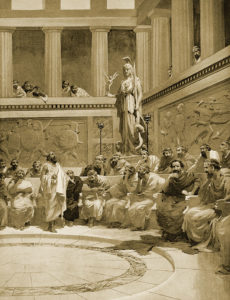
War hawks in the ecclesia floated more immediate versions of this distant scenario: A pre-emptive attack on Syracuse would deny the Peloponnesians both a military ally and Sicilian grain. But it wasn’t a defensive mindset that drove Athens. It thought more of acquiring such advantages than of denying them to others. Further, Sicily was not the limit of Athenian ambition. Imperialist statesmen desired the conquest of Italy and North Africa, and indeed the rule of the whole Hellenic world.
Further muddling the invasion plans was the ecclesia’s decision to place it under tripartite command, with Nicias, Lamachus and Alcibiades sharing joint control. The statesmen likely believed that three such different commanders—the conservative and cautious Nicias, the reliable veteran Lamachus and the eccentric firebrand Alcibiades—would balance one another’s strengths and weaknesses to better ensure success.
In the end, however, the conflicting strategic purposes and divided command only undermined the tactical coherence of the invasion of Sicily, spelling doom for most of the officers and men tasked with carrying out the dangerous mission.
The fleet that sailed from the Piraeus was grand. One hundred thirty-four triremes carried 5,100 Athenian and allied hoplites, 480 archers, 700 slingers, 120 other light troops and 30 horsemen and their mounts. Carrying food and supplies were 30 cargo ships, with 100 small vessels to attend them. While the fleet looked impressive in its home harbor, its sufficiency when measured against the foe had yet to be determined.
The Athenian fleet skirted more than 800 miles of the Ionian coast without losses or delays. When it reached the southern Italian port of Rhegium, the three commanders met to discuss how to proceed. Of course there was division of opinion. Discouraged by lack of local support, Nicias recommended settling the quarrel between Segesta and the Syracusan-backed forces, then sailing by the coastal cities to impress locals with the might of the Athenian fleet. That done, the ships should sail for home.
Such a timid course was anathema to Alcibiades, whose reputation and ambitions were closely bound with the expedition. He had wanted a war and considered it disgraceful to depart without accomplishing anything of importance. He proposed dispatching heralds to entice more Sicilians to revolt against Syracusan hegemony, thus making allies who could provide the expedition with grain and reinforcements. An alliance with Messana (present-day Messina), with its favorable location and excellent harbor, was particularly desirable.
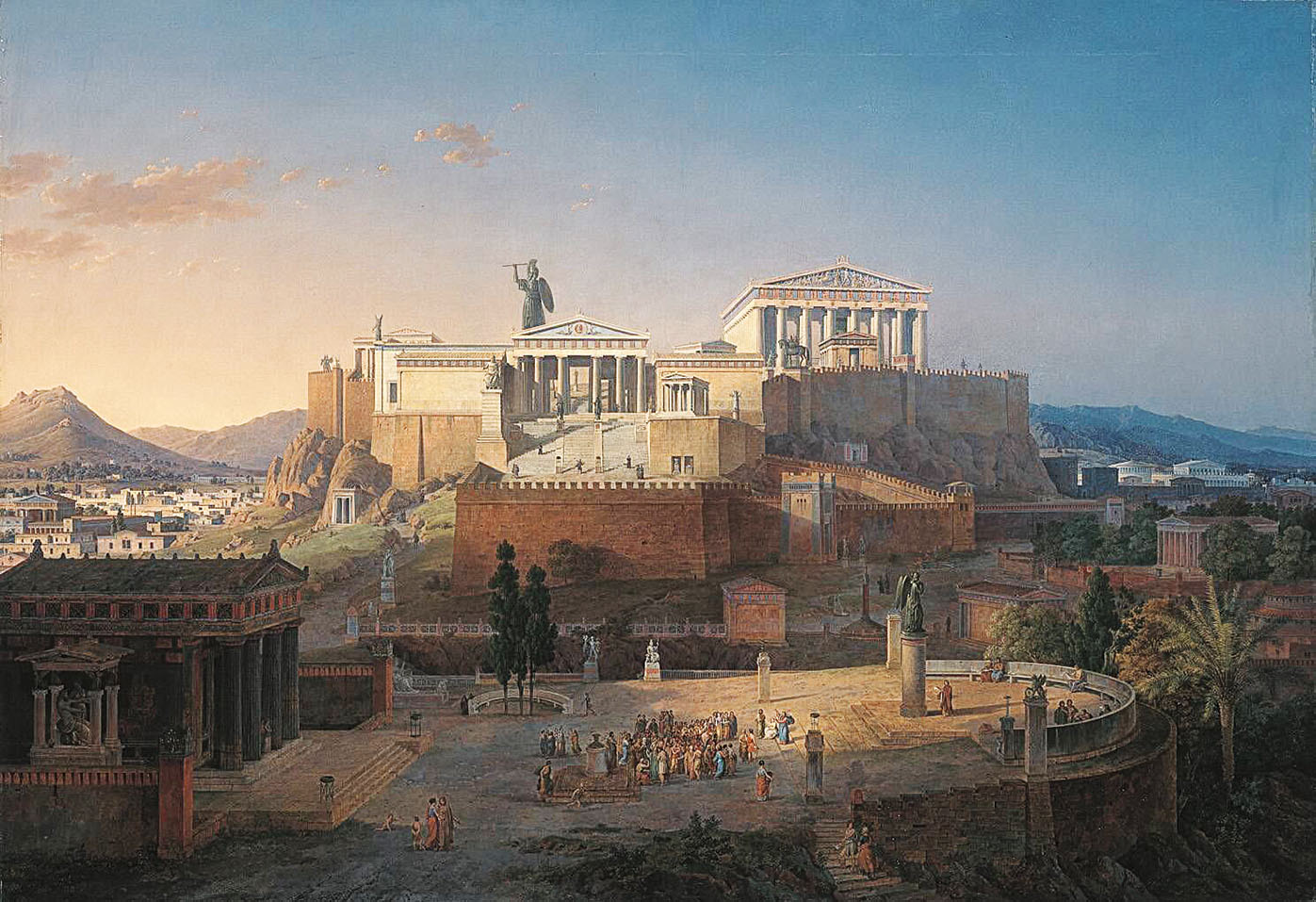
The old warrior Lamachus thought both plans foolish. This was the moment of greatest opportunity, he argued. While Syracuse remained unaware of the fleet’s presence, the Athenians should sail directly to the city and attack. The result would terrify the Syracusans and perhaps shock them into surrendering. After failing to persuade the others, however, Lamachus backed Alcibiades, and the decisive moment was lost.
Alcibiades did not receive the warm reception he’d anticipated at Messana, and the Athenians spent the rest of the season in a largely fruitless attempt to secure allies in Sicily, managing only to force their way into Catana and establish a base of operations there. Beyond a reconnoiter of the harbor at Syracuse and sack of the inconsequential city of Hycarra, the Athenians accomplished little before winter descended.
But something of great importance to the fate of the invasion and the larger war did occur: The ecclesia recalled Alcibiades to Athens on allegations of sacrilege and oligarchic conspiracy. The state trireme Salaminia soon arrived to escort him to trial. But Alcibiades, suspecting an unfavorable outcome, jumped ship in Italy. Soon returning to Greece, he turned traitor, helping the Spartans plot against his native Athens.
Meanwhile, Nicias and Lamachus discovered they lacked sufficient cavalry for victory in Sicily. Any force sent out to forage or plunder faced harassment by hundreds of enemy horsemen and the risk of being cut off and destroyed. Absent the protection afforded by mounted troops, the hinterlands were inaccessible to invaders afoot. Catana had become a snare rather than a stepping stone, the Athenians more like the besieged than the invaders. They would come to grips with Syracuse, but an overland march was too risky. They resorted to subterfuge.
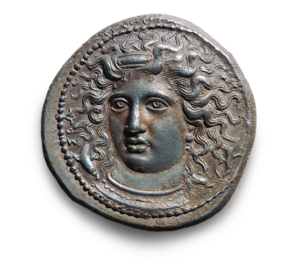
By spreading misinformation, the Athenians tricked Syracuse into deploying its forces overland toward Catana in hopes of dislodging or destroying the invaders. As the Syracusans approached the city, however, the Athenians sailed by night down the coast unopposed, landing and establishing a camp on the shore of the Great Harbor, south of Syracuse, before its defenders could return. Battle was joined the next day. While the Athenians easily routed the inexperienced Syracusan infantry, they were unable to press their advantage for fear of the enemy cavalry.
As the Athenians could hardly pass the winter on the beach so near Syracuse, they sailed back north to Catana. Pinning their hopes on receiving requested money and cavalry from Athens, there they waited, wasting months, while the Syracusans revamped their command structure and fortified their city. Athenian reinforcements (comprising some 250 horsemen and 30 mounted archers) arrived in the spring, bringing with them the funds to secure 400 more mounts and riders from their Sicilian allies.
With their bolstered cavalry, the invaders finally had sufficient protection to extend their fortifications, forage and meet the enemy on open ground. Lamachus must have rejoiced. At last the Athenians could prosecute the war they should have launched immediately on arrival.
But the Athenians were not alone in receiving reinforcements. The Syracusans had notified Sparta of Athens’ vulnerability. Further prompted by the rebel Alcibiades, the Spartans declared the Peace of Nicias broken. They resolved to send a Peloponnesian fleet to aid the Sicilians and prepared to invade Attica.
In the summer of 414 bc the Athenians seized the heights of the Epipolae—a cliff and raised plateau north of Syracuse—their first step in an effort to choke off the city from the surrounding countryside. They began the circumvallation by building a round fort dubbed the Circle, which would anchor walls being built northward to the sea and southward toward the Great Harbor. The tide of war seemed finally to have shifted in the Athenians’ favor.
Fearing enclosure, the Syracusans began building a counter wall outward from the city to cut the Athenian lines. Thus began a strange war of walls in which each side sought to outbuild the other while mounting skirmishes and raids to disrupt the other’s efforts. The Athenians won the first contest and demolished the Syracusans’ counter wall. The defenders immediately set to work on another, this one supported by an adjacent trench. While the Athenians also took these fortifications with a swift, determined assault, it came at a high cost. Lamachus was killed. With his death the last embers of initiative and military expertise in the Athenian command perished. Nicias, timid by comparison, was left in sole control.
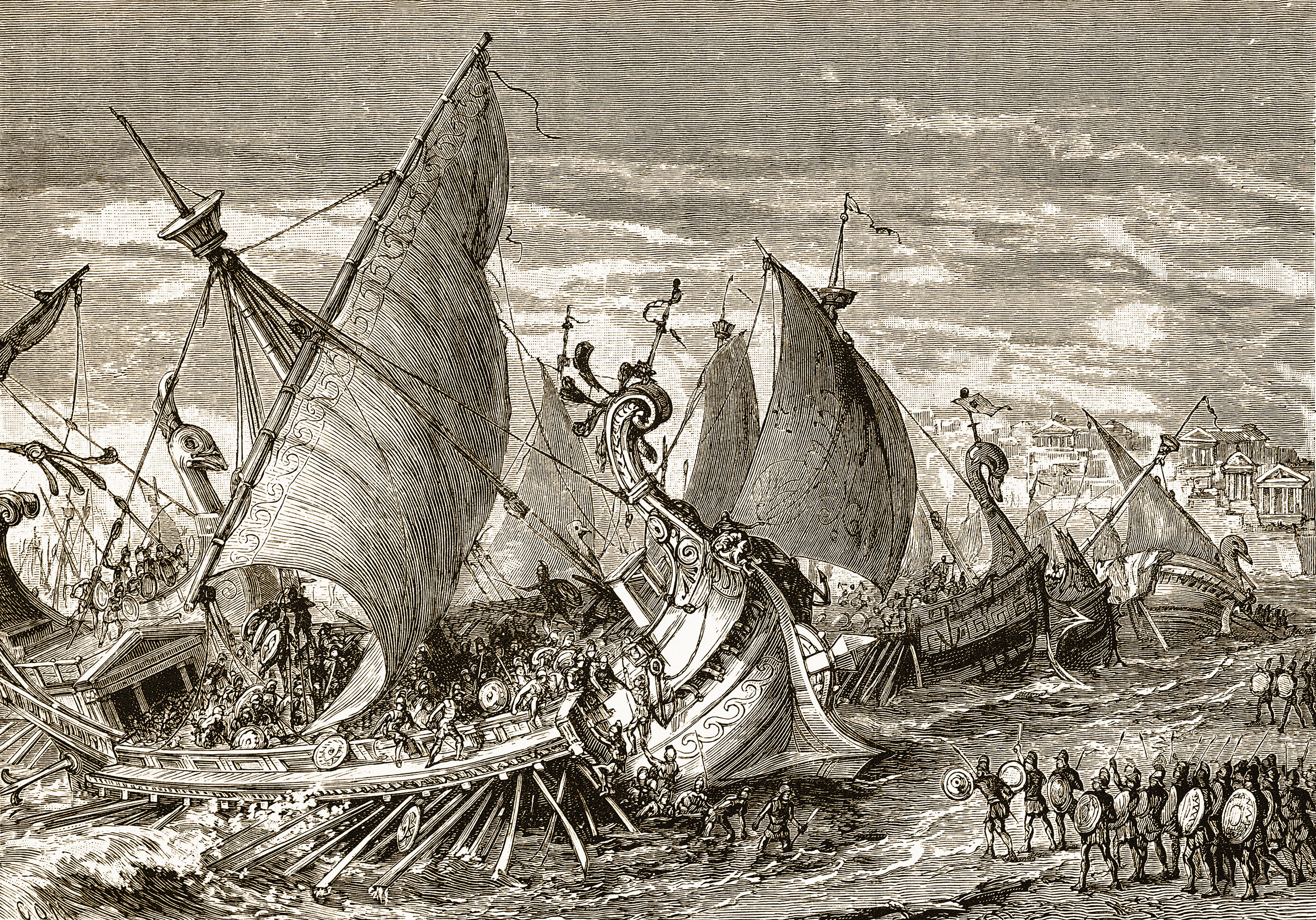
Reports of the approaching Peloponnesian fleet under the Spartan commander Gylippus failed to spur Nicias sufficiently to complete the circumvallation. Though the Athenian line in the north remained short of the sea, he dawdled, and the window of opportunity closed. The Peloponnesians’ arrival drastically altered the situation, robbing Nicias of both his psychological and numerical advantages.
Landing at Himera, Gylippus marched overland with 700 sailors and marines, 1,000 hoplites, and 1,000 allied Sicilian light troops and cavalry. He arrived at the critical moment, as the wall was so near completion the Syracusans had contemplated surrender. The Spartan’s appearance breathed new life and hope into the defenders. Battle raged on the heights as the Athenians strove to complete their works while the defenders sought to disrupt them, raising yet another counter wall. After a number of hard-fought clashes, the Syracusans built past the Athenian line, delivering the city from the danger of encirclement. Athens had lost the war of walls.
Nicias’ position was grim. Eluding the Athenian fleet, the Peloponnesian ships had sailed safely into the Great Harbor. Meanwhile, Syracuse had been outfitting and training its own fleet. The combined Spartan-Syracusan naval force posed an existential threat to the deteriorating Athenian navy, its ships waterlogged and its allied crews deserting. Gylippus successfully recruited his own allies across the island, pressing them for any reinforcements that could be spared in order to hammer victory home. As Syracusan hopes soared, Athenian morale plummeted, and their indecisive commander became even more cautious and despondent.
That winter Nicias dispatched a letter to Athens expounding the difficulties in Sicily. The situation was so critical, he argued, the ecclesia must either recall the fleet or massively reinforce it. Citing a kidney ailment, he also asked to be relieved of command.
Athens responded with convulsive energy. Nicias would not be relieved, but he would be reinforced by an auxiliary fleet under Demosthenes. Pouring reinforcements into Sicily, the Athenians had within two years committed more than half of their military assets—almost 45,000 men and 216 ships—to this one campaign. When the final reinforcements arrived, the Spartans were encamped just 13 miles from their walls, and the Athenians’ tribute-paying allies were on the verge of revolt. Athens was straddling a thin line between daring and madness.
When Demosthenes arrived in Sicily in the summer of 413 BC, the Athenian situation had not improved. Frustrated on the Epipolae, Nicias had moved his base of operations to Plemmyrium, at the south entrance to the Great Harbor, where he’d built three forts. He’d also transitioned to a naval strategy, planning to take to the offensive in the harbor. But the Athenian ships had not fared well against the Corinthian and Syracusan fleets. The Syracusans relentlessly attacked by land and sea, thwarting the Athenians on the heights and taking the forts at Plemmyrium, which housed most of the fleet’s supplies.
Resolving not to succumb to Nicias’ lethargy and lose the momentum of his arrival, Demosthenes launched an immediate attack on the Syracusan counter wall. When the assault failed, Demosthenes, driven by the pressure of the moment, decided to attack the Syracusan fortifications on the Epipolae by night. Hampered by darkness, unfamiliar terrain and confusion, the attack turned into a disaster. Though the audacious commander had struck swiftly with all the power at his disposal, his efforts fell short.
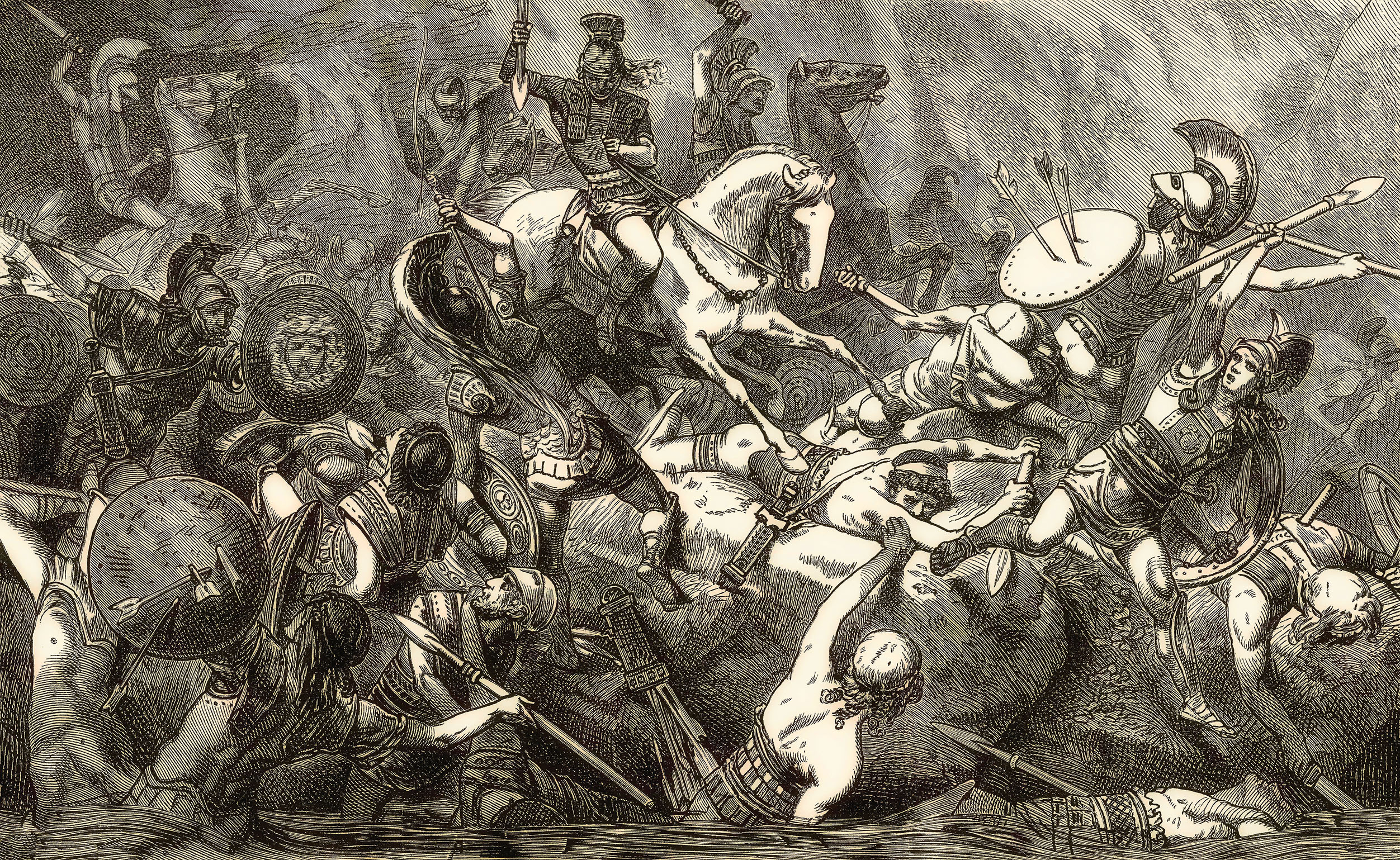
Demoralized by his failure, Demosthenes recommended withdrawing the invasion force, astutely concluding its military strength would be better used at home than in a hopeless struggle to subdue Sicily. Yet now it was Nicias—evidently more concerned for his own reputation than about military results—who adamantly opposed departure. Not eager to return home bearing responsibility for a wartime disaster, he preferred death at the hands of the enemy than by a judicial sentence in Athens.
Arguing Syracuse could not bear the strain of the siege much longer, he persuaded Demosthenes to remain. But as enemy reinforcements continued to flood into Syracuse, Nicias at last agreed to sail away. At that critical juncture, a sudden lunar eclipse convinced the superstitious Nicias to delay another 27 days.
Determined not to let the Athenians slip the noose, the Syracusans began to seal the mouth of the harbor with moored boats. Observing their efforts, the Athenians prepared every ship they had left for a breakout attempt. To motivate his men, Nicias appealed alternately to their patriotism, self-interest, glory, pride, wives, children and gods—as if trying to conjure a spell that would bring success. The respective fleets joined battle with great zeal. With little room to maneuver, the harbor became a tangled mass of colliding ships whose crews and marines fought across the decks almost as if they were on land.
Ultimately, the Athenian fleet was routed. Waiting anxiously ashore, the Athenian army watched as trireme after trireme slipped beneath the debris-strewn surface. Surrendering to panic and despair, surviving crews grounded their ships and fled into camp.
The Athenians’ only hope lay in an overland retreat, but again there was a delay. Duped by misinformation from the enemy not to march by night, lest they be ambushed, the Athenians spent another day ashore packing up what could be carried. The Syracusans used the time to occupy strategic points along the possible escape routes. On the third day after the naval battle the Athenian army departed. Leaving bodies unburied and ignoring pleas from the sick and wounded to be taken along, the 40,000-strong army marched out thinking only of survival.
By the time Nicias encamped on high ground to muster the Athenian army’s remaining strength for the next stage of their grueling march from Syracuse, Demosthenes and the 6,000 men of the rearguard had already surrendered.
When informed, Nicias offered his enemies a handsome bribe if they would allow the remainder of his forces to proceed unharmed. The Syracusans met the proposal with howls of derision and showers of missiles. The watchful enemy thwarted Nicias’ subsequent attempt to escape in darkness, and the Athenians passed another unpleasant night with no provisions or water to ease their weariness. The next day they pushed on. They would not escape.
Thucydides’ account of the Athenian invasion of Sicily ends with a sorrowful reflection: “Few out of many returned home.” MH
Justin D. Lyons is an associate professor of history and government at Ohio’s Cedarville University and a frequent contributor to Military History. For further reading he recommends History of the Peloponnesian War, by Thucydides; A War Like No Other, by Victor Davis Hanson; and The Peloponnesian War, by Donald Kagan.
This article appeared in the May 2021 issue of Military History magazine. For more stories, subscribe here and visit us on Facebook:

